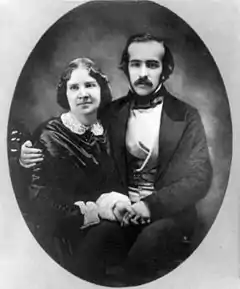Jenny Lind private railroad car
The Jenny Lind private railroad car is the first specifically outfitted private railway coach. It was used on Jenny Lind's singing tour of the United States.[upper-alpha 1][upper-alpha 2][upper-alpha 3]


History
The idea of a private railroad car came out of need. P. T. Barnum brought the well known soprano singer Jenny Lind to America from Sweden for a singing concert performance tour. He did much advance publicity even before she arrived in the United States, under the Nom des artes of the "Swedish Nightingale." Thousands of people followed her wherever she went.[4] The newspapers coined the term "Lind mania" because of all the crowds that gather around her.[5] She and her husband were much annoyed by the many disrespectful interviewers that wanted to know all about the newly wed couple.[6] To solve the problem Barnum designed a special railroad car for Jenny's comfort so she could tour the nation and escape the crowds of people that wanted to speak to her.[7] The first private railroad car ever made was then born for Jenny Lind and her 1850-52 concert tour across the United States.[8][9][10]
Description
Barnum first purchased a normal passenger railroad car and had all of its seats removed to be remodeled for comfort as she requested into a "parlor car."[11] Then he had it specially designed as a private living quarters in a drawing-room style with chairs, tables, and parlor style furniture that she and her husband could temporarily live in while traveling.[12] This way then she was able to travel on her singing performance tour from city to city privately without the intrusion of interviewers.[13] Lind was the first person to travel in this unusual method.[14] The private railroad car concept attracted much attention with those of up-scale expensive tastes. The wealthy then mimicked that method of travel and made their own personal private railroad coaches. The concept however was slow in developing. When it did take hold in society it eventually took further form as deluxe palace cars and dining cars.[6] It also developed into the luxury Pullman chair car.[11]
References
Notes
- "The first private railroad car was outfitted for the singer Jenny Lind, the 'Swedish Nightingale,' who made her first American appearance on September 11, 1850, at Castle Garden, New York City. The car was used on her tour of the country."[1]
- "Jenny Lind, the "Swedish Nightingale," had the first private railroad car especially outfitted for her use, during her tour of the United States in 1850."[2]
- "Jenny Lind is also known for something unrelated to her singing: the first private railroad car was designed specifically for her and was used during her tour of the United States."[3]
Citations
- Kane, Joseph (1997). Famous First Facts. New York City: H.W. Wilson Company. p. 464, item 6375. ISBN 0-8242-0930-3.
- "Jenny Lind the "Swedish Nightingale"". Newport Daily News. Newport, Rhode Island. August 6, 1952. Retrieved March 25, 2015.
- Iversen 1977, p. 62.
- Walford 1862, p. 326.
- Linkon, Sherry Lee. "Reading Lind Mania: Print Culture and the Construction of Nineteenth-Century Audiences", Book History, Vol. 1 (1998), pp. 94–106 (subscription required)
- Railway and Locomotive Engineering: A Practical Journal of Motive Power, Rolling Stock and Appliances, Volume 9, Angus Sinclair Company, 1896, p. 819
- "Jenny Lind, the "Swedish Nightingale," had the first private railroad car". The Evening Independent. Massillon, Ohio. August 21, 1952. Retrieved March 25, 2015.
- "Page 16". The Progress. Clearfield, Pennsylvania. August 7, 1952. Retrieved March 25, 2015.
- "Page 7". The Index-Journal. Greenwood, South Carolina. July 31, 1952. Retrieved March 25, 2015.
- "page 20". The Evening Independent. Massillon, Ohio. August 21, 1952. Retrieved March 25, 2015.
- "Jenny Lind Responsible for the Parlor Car". Baltimore Sun (pg. TN2). Baltimore, MD. March 25, 1923.
- Locomotive Engineer (1900), The Bay View Magazine, Volumes 7–8, Bay View Reading Circle, p. 275
- "Of Mozard, Hoover Harvard, and..." The Ledger. Lakeland, Florida. October 25, 1977. Retrieved March 25, 2015.
- Durant 1980, p. 98.
Sources
- Durant, John (1980). The Presidents of the United States: a history of the Presidents of the United States with an encyclopedic supplement on the office and powers of the Presidency, chronologies, and records of Presidential elections. A.A. Gaché.
- Iversen, Nick (January 1977). Record makers and record breakers. Jonathan David Publishers. ISBN 978-0-8246-0208-6.
- Walford, Edward (1862). Men of the Time: A Biographical Dictionary of Eniment Living Characters (including Women). Routledge Warne.